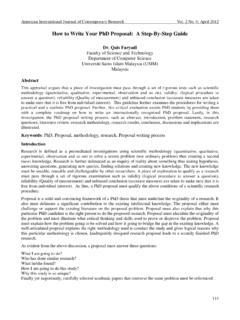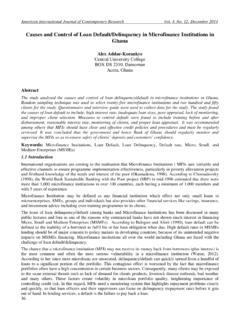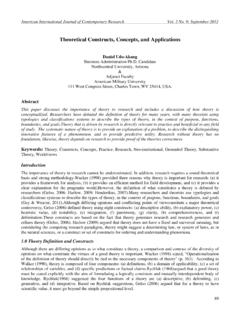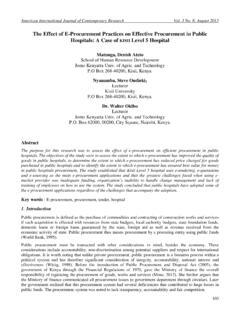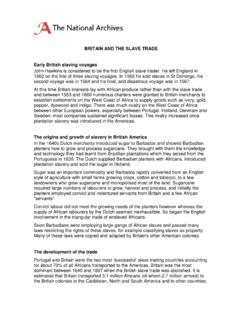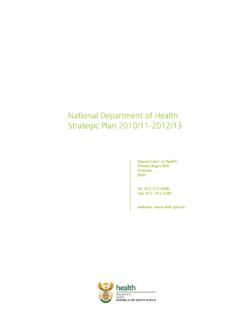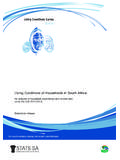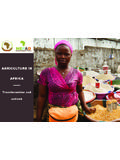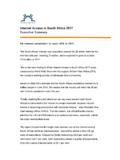Transcription of Africans and African Humanism: What Prospects?
1 American International Journal of Contemporary Research Vol. 4 No. 1; January 2014. Africans and African humanism : what prospects ? Egbunu Fidelis Eleojo, PhD. Department of Philosophy and Religious Studies Kogi State University Anyigba Kogi State Nigeria Abstract This work on Africans and African humanism is a philosophical enquiry into the significance of African sense of respect for the human person. The traditional values of hospitality, primacy of the person, respect for life, sense of the sacred, familihood, brotherhood, solidarity and other characteristic features of the communalistic life of an African person are brought into cognizance.
2 Applying the descriptive, analytic and phenomenological methods of enquiry and spreading forth the scope of our coverage to include not only black Negroes within the confines of the geographical configuration of Africa but also diasporans and those of any race and colour within the continent, practical examples are sourced in order to illumine our subject matter. Salient questions are raised with respect to the essence of the centrality of the human person, his/her dignity, right and the need for fair-play and sense of responsibility on the part of the citizenry and general leadership.
3 The notoriety of Africa and Africans in relation to their being religious in all aspects of life is being latched upon as a launch-pad for this all- important task. By and large, Africans are called upon not only to be more conscious of the latent potentials in this essentially humanistic light, but to harness and promote them assiduously and to give it a more cosmopolitan outlook as they anchor their lives on this rich cultural heritage. This, as it were, is expected to yield immense dividends of not only curbing violence, terrorism, genocide and all forms of social ills associated with our contemporary world, but it is also hoped that it will bring about the much needed peace, harmony and progress in all its ramifications world-over.
4 Introduction In a bid to provide an appropriate solution to the lingering debate for the past half-a-century on whether there exists what could be strictly termed African philosophy, researchers have unearthed a particular type of philosophy which is basically humanistic in orientation and ideology. Thus, this brand of philosophy is tagged African humanism . It is argued here that the undercurrent of this philosophy has its basis on the African worldview which is overtly humanistic in its characterization. In other words, the African outlook is ontologically anthropocentric, since everything in it is viewed in terms of its relation to the human person.
5 As Booth graphically affirms, it is centered more on man than on God or on nature (6). This same understanding is expressed by the Igala people of central Nigeria in the Igala name On ny which means the human person is innately good. The name implies that the human person is of far greater value than any possessions or anything whatsoever in nature. For the Igbo of Eastern Nigeria, the name Maduka denotes that the human person is the most valuable possession (Ikenga-Metuh 163), in the same token, the Yoruba of Western Nigeria use m niyi to remind themselves that child is wealth and alternately that the gift of a child is of far greater value than any other form of wealth.
6 The contention here is that the mindset or orientation of a typical African ought to be jealously preserved and promoted even to the globalised level along with her rich cultural heritage. For, as Kenneth Kaunda of Zambia succinctly put it, to a certain extent, we in Africa have always had a gift for enjoying man for himself. It is at the heart of our traditional culture the West have its Technology and Asia its Mysticism. Africa's gift to the world culture must be in the realm of human relationships (22). However, before undertaking a brief excursus on this all-important topic, it is pertinent to briefly clarify the key concepts therein, namely, Africans , African humanism and prospects .
7 297. Center for Promoting Ideas, USA Clarification of Concepts Africans refer to one or more of these three main ideas: First and foremost, those who belong to the geographical entity within the confines of the African continent (Northern, Southern, Eastern, Western and Central Africa inclusive). Secondly, various racial groups that inhabit the continent, whether they are of the North African Arab races, black sub-Saharan Africa, White South Africans or Negroes. And thirdly, those whose socio- political, historical and cultural ties link them to Africa.
8 In this sense, Africans are not one but many peoples and races with a diversity of cultural beliefs and traditions (Okolo 25). Most times, they are also tied together by similar history of colonial yoke or tutelage. They are not only characterized by same traditional beliefs and practices but also different languages and cultures. As such, whether they live in Diaspora ( African - Americans or African -Asians) or live within the continent, they are recognized as Africans . In other words, all those who regard Africa as their home directly in Africa or in Diaspora (Igwe 7) are considered properly so.
9 Igala people of central Nigeria and other language groups within the author's immediate reach shall thereby be used in drawing home many salient points. prospects simply refers to the possibility that something positive will emerge (Macmillan 1192, Chambers 1113) in order to bring about improvement, advancement, recovery. It has to do with what people should anticipate or look forward to or expect in the context of this investigation. African humanism in our context here refers to a philosophy which extols not only the good of the human person in general but also the good of the African person as the purpose of all actions.
10 It entails an active concern for his/her welfare as the central object of policy. It is an ideology which encourages the best in the evolution of society and the treatment of mankind, and in the exploitation or use of his natural environment (Igwe 189). It is quite significant to observe too that even ecological concerns form part of the humanistic challenges of an African . That explains why Igwe further defines humanism as embracing, the creation of the conditions that are favourable to the practical exercise of man's fundamental rights, and the treatment of his pains and tribulations as a direct concern of the collectivity (189).
